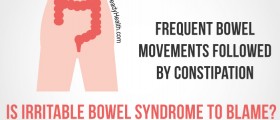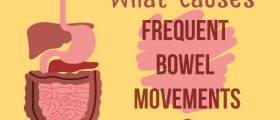Many conditions may cause intestinal discomfort and gas. Flatulence may be a result of gas produced by intestinal bacteria when they digest sugars and polysaccharides. Intestinal discomfort may be indicative of tumors or enlarged organs. However, some of the primary causes of the above stated symptoms are described below:
Irritable Bowel Syndrome (IBS)
IBS is most often a chronic condition. However, symptoms may be prolonged and severe or short-lived and mild. Unlike inflammatory diseases of the bowel, IBS does not cause any permanent changes in the bowel tissue.
Symptoms vary among individuals, the most common being abdominal cramping and distention, along with alternating episodes of diarrhea and constipation. Other signs and symptoms include a persistent feeling of fullness and mucus in the stool.
Since the cause of IBS remains unknown, there is no particular treatment. Changing dietary habits, adopting a healthy and active lifestyle and reducing stress are among preventive and relief-causing measures. In certain cases, medication and counseling may also be required to manage and deal with the symptoms of IBS.

Inflammatory Bowel Disease (IBD)
It includes two types of conditions; ulcerative colitis and Crohn's disease. Ulcerative colitis involves the long-term inflammation of the innermost lining of the colon (large intestine) and rectum. Crohn's disease affects the lining of both, the small and large intestine, and causes inflammation of deeper tissues as well.
Symptoms for IBD include abdominal cramping and gas, reduced appetite, severe diarrhea weight loss, and fatigue. Despite there being no effective cure, these symptoms can be managed by altering dietary habits and taking certain medication.
Celiac Disease
Also known as gluten-sensitive enteropathy or celiac sprue, celiac disease is an autoimmune disorder of the digestive system. The lining of the small intestine becomes damaged because of gluten ingestion, the protein found in grains.
The severity of symptoms varies among individuals, and includes abdominal bloating, diarrhea, skin rash, iron-deficiency anemia, ulcers in the mouth, and even missed menstrual periods. Celiac disease can also make an individual susceptible to other conditions, such as growth problems, osteoporosis, and in extremely severe cases, cancer of the small intestine.
Omitting gluten-containing foods (wheat, oats, barley, etc) from the diet usually helps in improving and relieving the symptoms of celiac disease. The villi (absorptive surfaces of the intestine) mostly heal within six months. However, if this damage is very severe, nutritional supplements may be given intravenously.
Abdominal/Intestinal Tuberculosis (TB)
Intestinal tuberculosis is a disease involving the ileocecal region of the digestive tract, resulting in mucosal hypertrophy and enlargement of the lymph nodes. These abnormalities cause mal-absorption, peritonitis and intestinal obstruction. The most common sites of infection are the stomach and small intestine. The condition is more common among young women and elderly men, particularly those who are alcoholic.
Signs and symptoms of intestinal tuberculosis include abdominal tenderness, anorexia and weight loss, diarrhea, vomiting, night sweats and fever. Rectal bleeding may also occur in severe cases, which even become a life-threatening condition.
Keep in mind that very first step in case of frequent intestinal discomfort and bowel urges is to change dietary habits. More than 50 percent of cases are known to resolve with dietary and daily routine modifications. If the symptoms don't resolve, it is better to pay a visit to your doctor rather than to self-medicate.
















